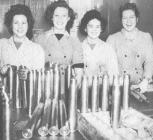113
Four women from Pedlar inspecting 40mm anti- aircraft cartridge cases20th Century 1939-1946
Pedlar, Oshawa, Ontario
 Credits:
Credits:Pedlar People Ltd. "Metal Built Products in Wartime"
Oshawa Community Archives
114
"After the war I went to teacher's college in Ireland and became a teacher. I taught there from 1946-1956. My friend Bill Clarke - we were boyhood friends, came to Canada first. I kept in contact with Bill by mail. Bill said 'why not go to South Africa or why not Australia'? I said better still, I have an aunt and uncle in Oshawa and Bill said his wife's aunt lived in Oshawa as well. There you are, why don't we go to Canada? I came in 1956. I came on the ship Roonaghhead. Bill came on an American ship in 1953 and boarded with his wife's aunt and uncle. When I came I stayed with my cousin Ernie Thompson." - Alex Hill
"War takes a toll every day in more ways than the obvious. "Diagnosis - worn out"
They pulled me out of the line and said "you're going home" I jumped off the train when it stopped in Oshawa. We were headed to Toronto. I came up to William Street to surprise my wife and drop off one of my bags. I had to get back on the train to Toronto or I would be AWOL (Absent Without Official Leave). They wanted you to go to Toronto to pick up the troops. We didn't want them to come to get us - we didn't want to break down. The war was such a shock I don't think we have gotten over it yet. They allowed me one month and I took it. Then I went back to work at the hospital in Whitby." -Earl Hann
"I returned from the war on Tuesday November 27th 1945 - it was snowing. I was a gunner; we marched from Union Station to the armories in Toronto. I served for two and a half years. After the war, we lived in two rooms on Bloor Street over a store. There was a long hallway and you could run into a neighbor if you had to use the bathroom at night." -Elmer Lewis
"I remember going to Chorley Park to see my brother come back in a body cast. He wore the bullets they had taken out of him on a chain around his neck. We took a lot of men in uniform out sailing. They never talked about what happened during the war - they were just happy to be out sailing and having a good time." - Lee Rolson
"We had to sign up for a washing machine or a fridge. We washed by hand for awhile. We were able to get a telephone because I was pregnant. Houses were scarce. They weren't building them - no building materials. There was an influx after the war and every one wanted a place to live. After the war things were really scarce. I didn't work after the war. War work was over and we decided we wanted to have a family." - Marion Manning
"A lot of the men who came home seemed to take a long time to mobilize and get back to work. My dad went back to work in June 1946. It was decommissioning. It was quite awhile he was off work. He never talked about the war. He wasn't sent overseas but he would see all the guys coming back on the ships. Every time his friend Martin came back on the ships there was a celebration. They had a few toddies." -Murray Mackay
"After the war they were anxious for us to move and we went back to Oshawa. The plant was taken over by the University of Toronto to accommodate soldiers returning home so that they could provide university education for them." -Syd Hopkins